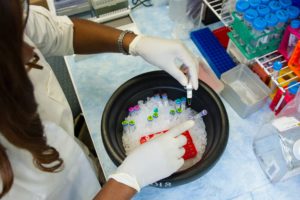Latest news
New knowledge for the SDGs: How to secure funding for international development research
Written by Gunn Benjaminsen
May 19, 2020
Five years ago, the world’s leaders stood united behind a new blueprint to achieve a better and more sustainable future for all. By 2030, we should have reached the ambitious set of goals and targets, known as the Sustainable Development Goals (SDGs). But progress is slow and patchy. The pandemic threatens to reverse some of the progress that we have seen in recent years. Getting back on track requires huge efforts – also from academia. Research and innovation are vital to end poverty, stop hunger, ensure good health, and the 14 other SDGs.
On 13 May, around 30 early-career researchers joined LIDC and Queen Mary, University of London (QMUL) for the online Grantsmanship Seminar. These post-docs could be the ones to find solutions to the most pressing issues the world is facing. But the first hurdle can also be the biggest: How to secure funding for research in international development.
Dr Sharon Ellis, Director of Research Services at Queen Mary University of London, chaired the joint LIDC-QMUL event.
Applications: What does the panel see?
Professor Claire Heffernan, LIDC Director, spoke about what good interdisciplinary proposals should look like – and what is likely to put panels off. One such pitfall is to propose projects that short-change partners in the Global South.
“Demonstrate equity. It is good practice in research, you should be doing it, it should be an equal level playing field”, she stressed.
Professor Heffernan gave a number of tips on how to get a proposal right. In the international development sphere, strong proposals have a demonstrable impact on vulnerable populations. But the demand side is equally important:
“Do the people who will be affected need, want or desire this research?”, she asked.
Not everything goes exactly according to plan, no matter how well a research project is researched and planned. Risk is inherent and shouldn’t be glossed over. Instead, a proposal should demonstrate what measures the project will take to mitigate these risks. Sloppy budgeting is another mistake that panels pick up on.
“Don’t underestimate the panel’s wealth of knowledge. They may know exactly how much items on the budget should cost”, she said.
Professor Heffernan is an advocate for interdisciplinarity, but only when multiple disciplines can give better answers to research questions than one discipline alone can. She warned against ‘add-on’ disciplines: In a good interdisciplinary proposal, each discipline is included because it adds value to the proposal.
Inclusive partnerships at the heart of LIDC
Dr Ana Antunes-Martins is LIDC’s research manager. She emphasised the need to align research objectives with the Sustainable Development Goals (SDGs) and to build meaningful partnerships.
“Academia needs to work with industries, businesses and the wider stakeholder community, especially local beneficiaries. This is beneficial for research development because priority setting is done jointly, and with the perspectives of everyone involved. This can also enhance the likelihood of impact and proper research uptake. This is at the heart of what LIDC does”, she said.
Dr Antunes-Martins provided a broad overview of the UK funding landscape with particular emphasis on public funding (UKRI, NIHR), and major funders from the Charity sector. She focused particularly on funding schemes relevant to international development including GCRF and Newton Fund, and provided guidance on how to find and choose suitable funding calls. Dr Antunes-Martins highlighted individual fellowships and research grants as possible funding streams for early-career researchers. She also pointed out that the definition of ‘early career’ varies a great deal between funders.
In light of the ongoing pandemic, Dr Antunes-Martins spoke about funding that is earmarked for research into Covid-19 and its wider societal impacts.
Scaling up research impact
Luke Cridland, Impact Engagement Officer at QMUL, spoke about impact in proposals. He discussed how the definition ‘impact’ varies. He also spoke about how impact can be measured both by significance and reach. Cridland gave examples from research on Hepatitis C in immigrants and interventions for refugee children to illustrate his points about impact.
The Grantsmanship Seminar showcased some of LIDC’s projects and allowed for researchers to make connections. If you are interested in submitting an interdisciplinary proposal, LIDC can provide support and advice to its members. Send an email to admin@lidc.ac.uk to get in touch with us.

